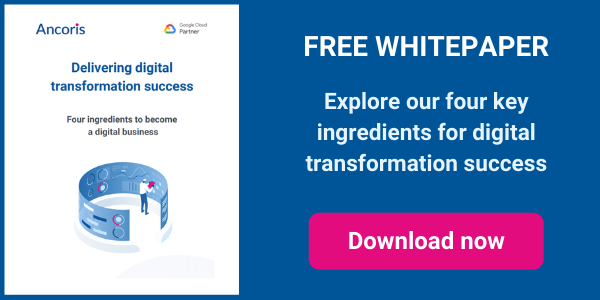Digital transformation is one of the top concerns of CEOs today. More than 80% of companies now have digital transformation at the centre of their business strategy, according to research by IDC.
Yet it's not always clear what people mean when they talk about digital transformation. In fact, digital transformation encompasses both:
- IT business improvement, which mostly focuses on transforming existing manual and often paper based business processes, through
- simple automation, with no significant changes made to the process
- transformation, using IT to enable a better process – one that may be faster, more convenient or removes steps that don't add value
- Digital business innovation, where the transformation
- creates new products and services with IT at their core
- creates a platform to support a whole ecosystem of users, customers, partners and suppliers that changes how they interact – delivering new revenue streams or improved customer service.
While some companies leap right in with digital business innovation – think Uber, for example – most start with simpler business improvement projects. Recently and in part due to the accelerated shift to online shopping, the focus of digital transformation has changed from simply optimising operations to improving customer interactions and creating new revenue streams based around digital business models. This shift in priorities is reflected by the statistic that in 75% of the companies surveyed by IDC, digital transformation is now led by business not IT.
Events in early 2020 have led to an acceleration of the adoption of cloud computing. Cloud doesn't just help you modernise your IT infrastructure and free you from worrying about the low-level nuts and bolts of your legacy IT operations. On top of giving you business resiliency out of the box, It also lets you quickly and easily – and cost effectively -- explore new technologies such as data analytics, Machine Learning and the Internet of Things, and then take them into production, at scale. In fact, according to IDC, digitally transformed organisations – your competitors – were already generating more than 35% of their revenues from new "digital" business models by 2020.
Yet, with so many exciting possibilities for innovation, it can be easy to feel overwhelmed. At Ancoris, we've developed a range of digital transformation workshops designed to help your company explore the possibilities of Google Cloud Platform (GCP) solutions such as data and analytics,, Machine Learning and the Internet of Things, as well as Google Workspace for remote working and team collaboration. Our workshops can also help you get more out of existing investments or kickstart specific digital transformation projects.
So if you're wondering what digital transformation means for your business and where to go next when it comes to creating a digital workplace, come and talk to our GCP experts about how we can support you in your digital transformation journey.
Updated June 2020
First published: April 2018

